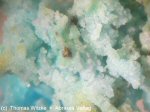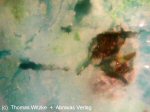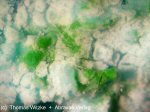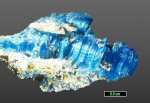Chalcanthite Mineral Data
General Chalcanthite Information
Chemical Formula: CuSO4•5(H2O)
Composition: Molecular Weight = 249.69 gm
Copper 25.45 % Cu 31.86 % CuO
Hydrogen 4.04 % H 36.08 % H2 O
Sulfur 12.84 % S 32.07 % SO3
Oxygen 57.67 % O
______ ______
100.00 % 100.00 % = TOTAL OXIDE
Empirical Formula: Cu(SO4 )•5(H2 O)
Environment: Secondary, formed in arid climates or in rapidly oxidizing copper deposits.
IMA Status: Valid Species (Pre-IMA) Prehistoric
Locality: Walls and timbers of copper mines. Link to MinDat.org Location Data.
Name Origin: From the Greek chalkos, "copper" and anthos, "flower." Generally pseudomorphous after Boothite.
Name Pronunciation: Chalcanthite + Pronunciation
Synonym: Blue Vitrol
Copper Vitrol
ICSD 20657
PDF 11-646
Chalcanthite Image
Images:
Chalcocyanite Chalcanthite
Comments: White to pale bluish chalcocyanite with darker bluish chalcanthite. The mineral is hygroscopic and must be stored in a closed box.Location: Ronneburg U deposit, Gera district, Thuringia, Germany.
Scale: Picture size 4 mm.© Thomas Witzke / Abraxas-Verlag
Images:
Images:
Images:
Chalcanthite Crystallography
Axial Ratios: a:b:c =0.5719:1:0.5579
Cell Dimensions: a = 6.12, b = 10.7, c = 5.97, Z = 2; alpha = 97.583°, beta = 107.167°, gamma = 77.55° V = 361.55 Den(Calc)= 2.29
Crystal System: Triclinic - Pinacoidal 1 ) Space Group: P1
X Ray Diffraction: By Intensity(I/Io ): 4.73(1), 3.71(0.85), 3.99(0.6),
Forms:
Mouse
Dbl Clk - Start-Stop Rotation Keyboard
S - Stereo
Help on Above
Forms:
( 0 2 1) ( 0 1 0) ( 1 3 0) ( 1 1 0) ( 1 1 1) ( 1 0 0) Warning: this java applet does not work in some browsers because of security restrictions.
Physical Properties of Chalcanthite
Cleavage: {110} Imperfect, {110} Indistinct, {111} Indistinct
Color: Green, Green blue, Light blue, Dark blue.
Density: 2.12 - 2.3, Average = 2.21
Diaphaneity: Subtransparent to translucent
Fracture: Conchoidal - Fractures developed in brittle materials characterized by smoothly curving surfaces, (e.g. quartz).
Habit: Encrustations - Forms crust-like aggregates on matrix.
Habit: Reniform - "Kidney like" in shape (e.g.. hematite).
Habit: Stalactitic - Shaped like pendant columns as stalactites or stalagmites (e.g. calcite).
Hardness: 2.5 - Finger Nail
Luminescence: Non-fluorescent.
Luster: Vitreous (Glassy)
Streak: white
Optical Properties of Chalcanthite
Gladstone-Dale: CI meas = -0.034 (Excellent) - where the CI = (1-KPDmeas /KC ) calc = -0.002 (Superior) - where the CI = (1-KPDcalc /KC )PDcalc = 0.2341,KPDmeas = 0.2415,KC = 0.2336
Optical Data: Biaxial (-), a=1.516, b=1.539, g=1.546, bire=0.0300, 2V(Calc)=56, 2V(Meas)=56. Dispersion none.
Calculated Properties of Chalcanthite
Electron Density: Bulk Density (Electron Density)=2.32 gm/cc
Fermion Index: Fermion Index = 0.0012460623
Photoelectric: PEChalcanthite = 11.43 barns/electronU=PEChalcanthite x r Electron Density= 26.52 barns/cc.
Radioactivity: GRapi = 0 (Gamma Ray American Petroleum Institute Units)Not Radioactive
Chalcanthite Classification
Dana Class: 29.06.07.01 (29) Hydrated Acid and Sulfates
(29.06) where A XO4 � x(H2O)
(29.06.07) Chalchanthite Group (Triclinic: P-1)
29.06.07.01 Chalcanthite CuSO4•5(H2O) P1 1
29.06.07.02 Siderotil FeSO4•5(H2O) P1 1
29.06.07.03 Pentahydrite MgSO4•5(H2O) P1 1
29.06.07.04 Jokokuite MnSO4•5(H2O) P1 1
Strunz Class: 07.CB.20 07 - SULFATES (SELENATES, TELLURATES)
07.C - Sulfates (selenates, etc.) without Additional Anions, with H2O
07.CB -With only medium-sized cations
07.CB.20 Chalcanthite CuSO4•5(H2O) P1 1
07.CB.20 Jokokuite MnSO4•5(H2O) P1 1
07.CB.20 Pentahydrite MgSO4•5(H2O) P1 1
07.CB.20 Siderotil FeSO4•5(H2O) P1 1
Other Chalcanthite Information
References: NAME( Duda&Rejl90) PHYS. PROP.(Enc. of Minerals,2nd ed.,1990) OPTIC PROP.(Ford32)
See Also: Links to other databases for Chalcanthite : Am. Min. Crystal Structure Database Amethyst Galleries' Mineral Gallery Athena EUROmin Project Ecole des Mines de Paris GeoScienceWorld Glendale Community College Google Images Google Scholar Handbook of Mineralogy (MinSocAm) Handbook of Mineralogy (UofA) MinDAT Mineral and Gemstone Kingdom Mineralienatlas (Deutsch) Online Mineral Museum Philatelic Mineralogy QUT Mineral Atlas Ruff.Info WWW-MINCRYST Search for Chalcanthite using:
[AOL ]
[Bing ]
[Dog Pile ]
[GeoScienceWorld ]
[HotBot ]
[Ixquick ]
[Lycos ]
[MAMMA ]
[Scirus ]
[Teoma ]
[WebCrawler ]
[Wikipedia ]
[YAHOO ]
Visit our Advertisers for Chalcanthite :
Ask about Chalcanthite here : Ask-A-Mineralogist from the Mineralogical Society of AmericaMindat.org's Discussion GroupsOriginal Rockhounds Discussion GroupRockhounds Discussion Group on Yahoo GroupsMineral Discussion Forum from Fabre Minerals - also available in
Español
Print or Cut-and-Paste your Chalcanthite Specimen Label here :
Chalcanthite
CuSO4•5(H2O) Dana No: 29.06.07.01 Strunz No: 07.CB.20 Locality:
Notes:
Dakota Matrix
Excalibur Minerals
Exceptional Minerals
Hudson Insitute
John Betts Fine Minerals
Mc Dougall Minerals
Mineral News
Rock and Mineral Shows
Weinrich Minerals, Inc.





